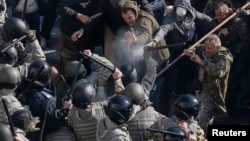With eastern Ukraine crippled by conflict between government forces and pro-Russia separatists, many democratic activists in Kyiv paint the struggle as having given birth to a new unified state.
They identify the call to resist what is widely perceived to be Russia’s aggression as having brought together a disparate mix of Ukrainian- and Russian-speakers, ardent nationalists, pro-Western reformers and even some who long for the old Soviet welfare state.
“Before, everyone said Ukraine is two countries – east and west. But now we’re becoming a political nation,” said Hanna Hopko, a young reformer on the front lines of the Euromaidan Revolution that ousted Moscow-backed president Viktor Yanukovych in February.
Yet the very changes that embody the Euromaidan vision have also revealed deep divisions in a society squeezed by war and economic hardship.
Ukraine’s first violent, anti-government demonstration in Kyiv since last winter’s upheaval occurred last week. The motives and affiliations of the protesters, many wearing masks, were not clear. Most news accounts described them as fringe nationalists. Some also saw Moscow’s hand in the unrest.
Parliamentary elections scheduled for October 26 are likely to produce a more polarized legislature, wrote Balazs Jarabik, a visiting scholar with the Carnegie Endowment for International Peace.
He listed a plethora of candidates with “no appetite for dialogue,” including dozens of fighters and other “military populists” such as captured female pilot Nadiya Savchenko, who, though held in a Russian prison, is number one on former prime minister Yulia Tymoshenko’s Batkivshchyna (Fatherland) party list.
Ukraine also faces further looming disruption as calls mount to overhaul the country’s barely altered Soviet-style bureaucracy.
A controversial “lustration” law, approved by parliament in September under huge pressure from activists, is due to take effect this week.
The law targets officials complicit in corruption and human rights violations and could result in the possible firings of up to one million civil servants, beginning with senior ministers and prosecutors who served under Yanukovych for more than one year.
Its legality has been questioned by rights groups and business leaders who fear the purge could lead to a damaging flight of experienced bureaucrats.
“Western-educated reformers are very much in a position to push,” Jarabik said. “These people are fantastic, but they’re still a tiny minority and extremely impatient. For many in the bureaucracy they are alien.”
“Unless there’s a plan to integrate these people into society, it will spark resistance,” he said. “You need to convince, to engage in dialogue.”
Reform drive
The pressure to quickly enact sweeping changes, however, may override such considerations.
Hopko, 32, and other Euromaidan leaders met with Council of Europe General Secretary Thorbjørn Jagland in Strasbourg earlier this year.
His comments, she recalled, were clear: after Ukraine’s failed 2004 Orange Revolution, her generation could not miss this opportunity to change the system through grass-roots democratic reform.
The Council, he said, was ready to support them; equally so, it appeared, were Ukraine’s post-Maidan leaders.
“The current administration is extremely focused on engaging with civic activists. We are in constant dialogue with them and other stakeholders to draft new laws,” said former Microsoft Ukraine CEO Dmytro Shymkiv, whom President Petro Poroshenko tapped in July to spearhead his reform efforts.
Recognizing they needed to channel protesters’ energy into concrete institutional change, the revolutionaries launched what they call the Reanimation Package of Reforms.
The initiative, co-founded by Hopko in March, now has more than 300 experts and 26 parliamentarians lobbying for progressive new legislation.
A measure securing independent public broadcasters passed in April. Laws ensuring transparency in public procurement and the appointment of judges are also on the books. Crucial action on decentralization and economic deregulation is in the works.
Ukraine’s parliament last week approved three sweeping anti-corruption bills, a move required by international lenders and sought by Western leaders and investors.
The legislation creates an independent Anti-Corruption Bureau empowered to conduct pre-trial investigations and file cases in the courts through its own special prosecutors.
It requires senior officials to disclose information about their property and open their bank accounts to monitoring for possible money laundering or other illicit transactions.
Civil servants must declare their income, and their lifestyles will be measured against it.
“We believe this is a chance to create real tools for tackling corruption,” said Daria Kaleniuk, 26, executive director of Ukraine’s Anti-Corruption Action Center, a local group that worked on the legislation for months with government and international stakeholders.
Looming bureaucratic pushback
But a serious overhaul of Ukraine’s entrenched bureaucracy will be neither quick nor easy, experts say.
The global anti-corruption watchdog Transparency International ranked Ukraine 144th out of 177 countries in its 2013 Corruption Perceptions Index.
Bribery and cronyism have been widespread throughout all areas of public life since Kyiv gained independence with the collapse of the Soviet Union in 1991.
The situation only worsened during the last four years under Yanukovych, when $11 billion was siphoned yearly through the abuse of public procurement tenders alone, Justice Minister Pavlo Petrenko said at a September 9 news conference, the Kyiv Post reported.
“For the past 20 years, corruption in Ukraine has come with relatively little cost to the bribe-taker compared to the benefits gained,” said Steven Pifer, a senior fellow at the Brookings Institution and a former U.S. ambassador to Ukraine.
“My guess is that once a few people are brought to account, the message will get around that there are risks and costs.”
At this point, though, public revulsion at Ukraine’s high levels of graft appears to have outrun legal remedies.
Since early September, radical protesters conducting vigilante justice “cleansing” campaigns have tossed about a dozen allegedly corrupt politicians into trash bins, some with accompanying beatings.
Law enforcement has been ominously hands off as the #TrashBucketChallenge has circulated on social media, and on the streets.
Meanwhile, public sector salaries have been slashed. Civil servants with five years’ experience can earn less than $90 a month, while the monthly electric bill for a two-room Kyiv apartment is about half that, according to Jarabik.
“Significant numbers of civil servants are not committed to change,” acknowledged Shymkiv, whose formal title is deputy head of the Ukrainian Presidential Administration.
“The bureaucratic environment is incredibly complex and highly regulated. These reforms are an attempt to transform the system. They will impact people’s livelihoods,” he said.
Economic free fall
With the east, despite a shaky truce, still mired in conflict and the entire country in economic free fall, the stakes could not be higher.
Western analysts say Ukraine's culture of cronyism, bribery and other forms of graft is largely responsible for the flight of Western investors who have abandoned the cash-poor country in the past five years.
“The International Monetary Fund gave Ukraine a second tranche [of its $17 billion emergency bailout] last month, not because we made any headway against corruption, but because they understand the situation in the east and that Ukraine could default,” Hopko said.
“The economy is worsening, [Ukraine’s currency] the hryvnia is devaluating fast and poverty is rising,” she said.
A recent Reuters poll showed analysts expect Ukraine’s economy to shrink 9.5 percent in the third quarter of 2014 compared to last year, its biggest contraction in five years. An expected GDP drop of 7.8 percent this year exceeds previous estimates.
A huge factor in the implosion is the precipitous decline in industrial output, especially in the war-ravaged eastern regions of Donetsk and Luhansk, where significant steel and energy production is based.
Fifty percent of Ukraine’s industrial infrastructure in those two provinces has been destroyed, President Poroshenko said earlier this month.
“Conflict in the east will be the top order of business after the elections,” Pifer said. “But if you delay reforms too long, the population will become disillusioned. It’s important that after the vote, a stable coalition come together to work with Poroshenko on reform.”
With more than 30 democratic activists running for parliament – including Hopko – the hope is Ukraine’s embattled politicians will see their future tied even more strongly to reform.
Most parties likely to win seats in the elections “are running under pro-European slogans and a radical reform banner,” wrote Baylor University’s Serhiy Kudelia.
He expects the new parliament to “reflect the political changes that have occurred in most of Ukraine since late 2013.”
Poroshenko recently unveiled his "Strategy 2020," a six-year roadmap highlighting eight key areas for reform and specific economic targets he hopes will put Ukraine on the path for European Union accession.
But his government is already widely seen as having lost control of the country’s east. That means Russia-backed separatists can further destabilize the region, seriously complicating Ukraine’s quest for EU integration.
“Are Russia’s efforts to stop Ukraine from joining the West complex?” asked Shymkiv. “Absolutely.”
“There will be disruption – we understand that. [But] we have to do this. If not, we’re right back to Russia and we don’t want that. Enough is enough,” he said.






